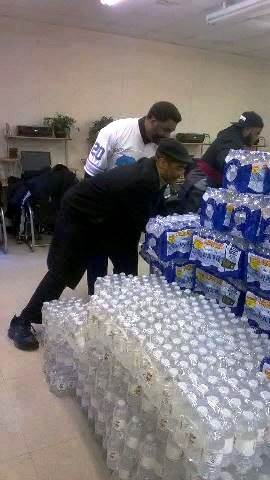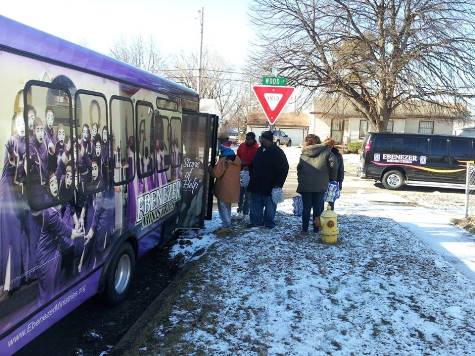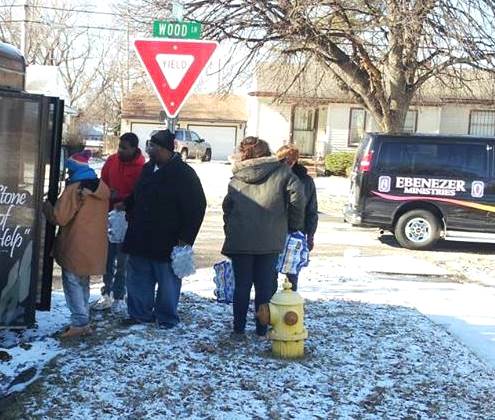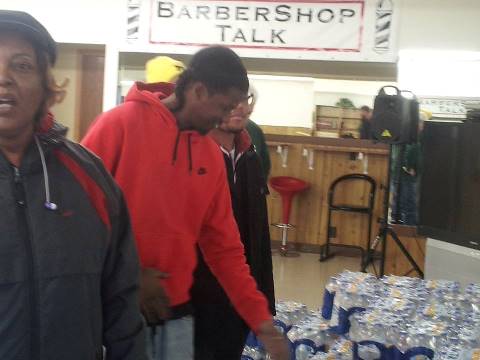
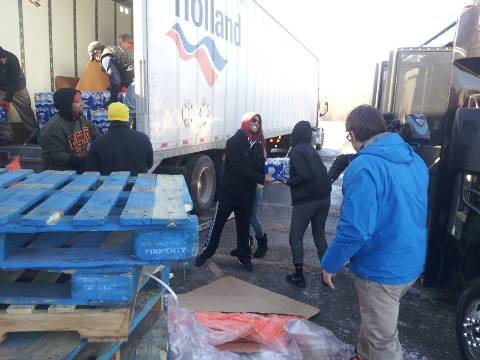
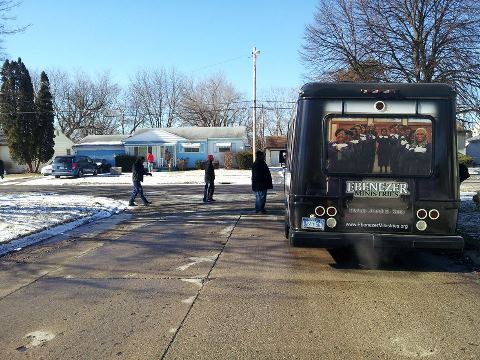
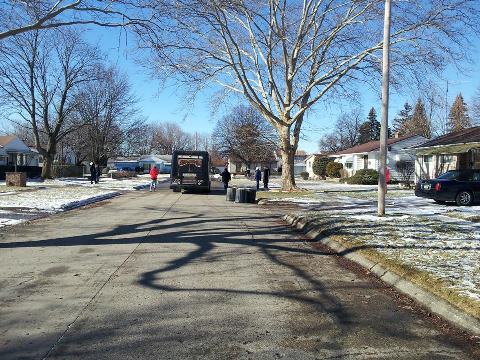
by Mary Rupert
When Kansas City, Kan., resident Janice Witt saw on the news that the people of Flint, Mich., needed bottled water, she didn’t just write a check and mail it off.
Witt, who is the director of the Reola Grant Center for Family Life Development, a charitable agency located at the Victory Dodge dealership at 6640 State Ave., cut through red tape and personally put bottled water into the hands of Flint residents.
People all over America have been sending water to Flint, but Witt did it in her own way. She chartered two freight trucks, and took 138,000 bottles of water to Flint residents, passing them out door-to-door on Feb. 5.
Witt heard on the news about the water crisis in Flint. When the government there decided to save money and switched the city’s source of drinking water, an estimated 8,000 children younger than 6 in the city were put in danger through lead in their drinking water. Lead has a damaging effect on the brain.
Something about the situation touched her.
“They are the cookie-cutter story of Wyandotte County,” Witt said, citing similarities such as large numbers of needy persons, a large blue-collar presence in the city, a large number of senior citizens, a lot of dilapidated property, an exodus of good-paying jobs there and white flight from the community. “It really felt like home.”
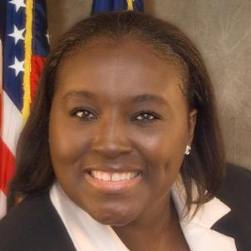
Witt began making phone calls to people in Flint to find out more about the situation. She discovered, she said, that residents’ bottled water was being limited. While various officials said the people had enough water, individuals told her that they needed more water.
A family was being allowed one case of bottled water per household, which the residents and Witt believe was not enough. A family can go through 10 cases of water in a couple of days, she said. Allowing eight bottles of water per person, a family of five could go through 40 bottles in one day for drinking, she said.
She believes that the residents need better water for bathing and washing clothes, as well as for drinking. “Even half filled it would take nine bottles just to fill a baby bath,” she said.
Plus, some residents had to go to fire stations to pick up the water themselves, she said, and it’s possible that elderly residents may not be able to make that trip.
Witt said she discovered that some of the donated bottled water was just sitting in warehouses in Flint and not being distributed because some of the charitable agencies there and volunteers could not do it, were not strong enough to lift it, or did not know about it. Sometimes, small food pantries have to pay a reduced fee to food banks to get water and food for the people they help, she said.
So Witt began to try to get some bottled water to Flint herself. Her efforts to get water from the food bank here to Flint were not successful. They had to abide by rules that prevented them from giving it without a direct request from Flint officials, she said.
Then Witt started calling the bottled water companies, begging for water for Flint. She got a lot of turn-downs, she said, until she reached one that she had previously talked to about donations. They recognized her name, and said they would empty their warehouse for her. However, she had to promise that they would remain anonymous, she said.
Victory Dodge, where her charity offices are located, provided a car to drive to Flint and a driver, she said.
Then Witt went to Holland trucking company in Kansas City, Kan., to arrange for the shipment of the water. The company decided to donate two semis to take the water to Flint.
As it turned out, Witt’s call to the Holland trucking company was successful especially because the trucking company started in Birch Run, Mich., about 20 minutes from Flint.
“It was an immediate connection for them that they would step in and do something,” Witt said.
After calling other charitable agencies in Flint, Witt partnered with the Ebenezer Ministries there to receive the water, then to go to the neighborhoods with her and pass it out door-to-door.
The church had 30 to 35 people helping unload the water, and they filled a 5,000-square-foot building with it. Water was loaded into vans and church buses. Then Witt and other volunteers walked the neighborhoods and handed out cases of bottled water.
They delivered 50,000 bottles of water on the first day, and another 80,000 bottles of water on the Monday following, she said.
Witt insisted that there would be no limits, and residents could have as much water as they wanted, she said.
Witt said she plans to take more water to Flint later.
“First, we’ve got to take care of home,” she added. “As much as we reach out and take care of Flint, we did that in our off time.”
She’s also trying to get 150 to 200 people here fed through her food pantry. At the Kansas City, Kan., location, she will sometimes get requests for bottled water from people whose water has been cut off through inability to pay their bills, she added.
Witt greatly values her experience in bringing water to Flint.
Witt wrote on her social media page, “We care, we hear you and we are coming with the best that we have got. Bringing some American water to show you some American love.”
“It was truly the most amazing experience,” Witt said about taking water to Flint. “It was like I left home and went home.
“It really touched me personally,” she said. “It was a very, very rewarding experience. It really was, but more than that, it was eye-opening because Wyandotte County is all over America. These folks are suffering the same suffering that we are suffering here. It looks the same, tastes and feels the same.
“What feels very good is that people can fix this problem, people like me can fix this problem,” Witt said. “We’re not waiting on anybody to fix that problem. We’re going to fix that problem.”
